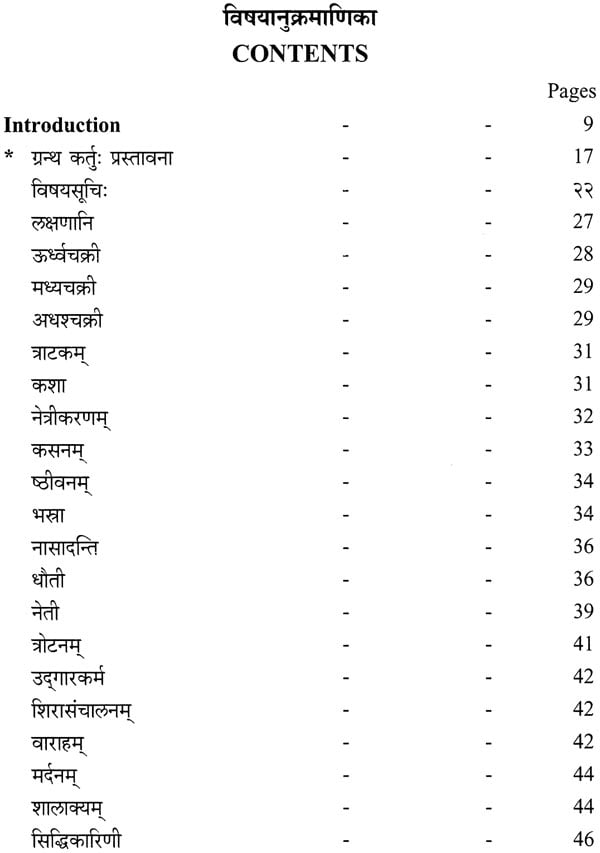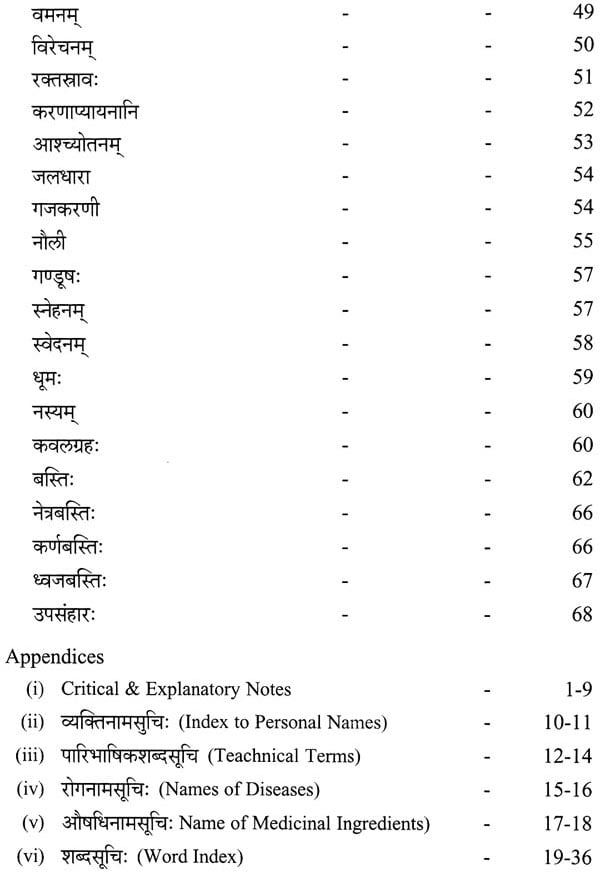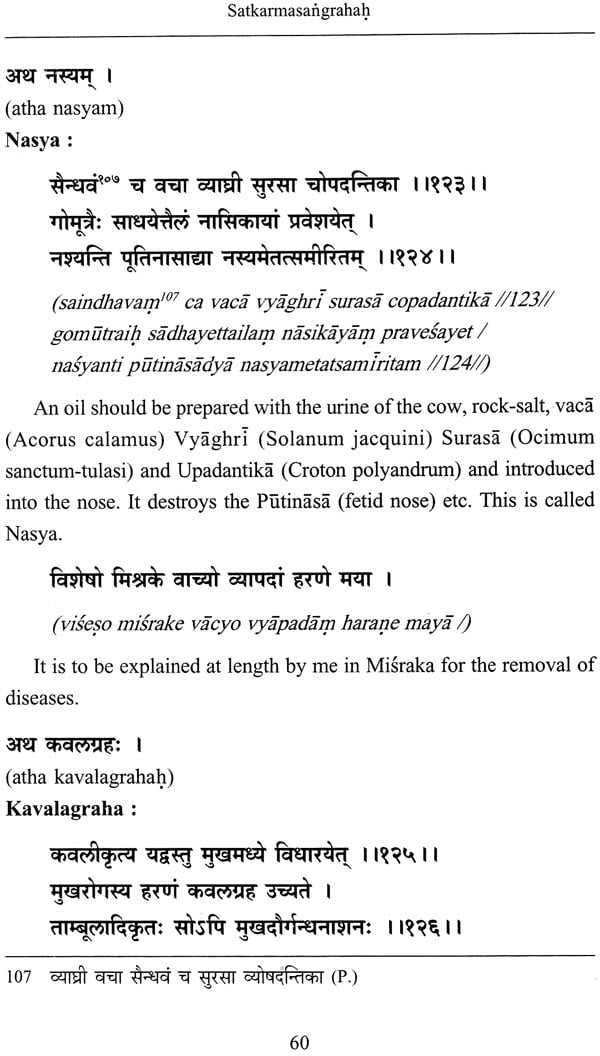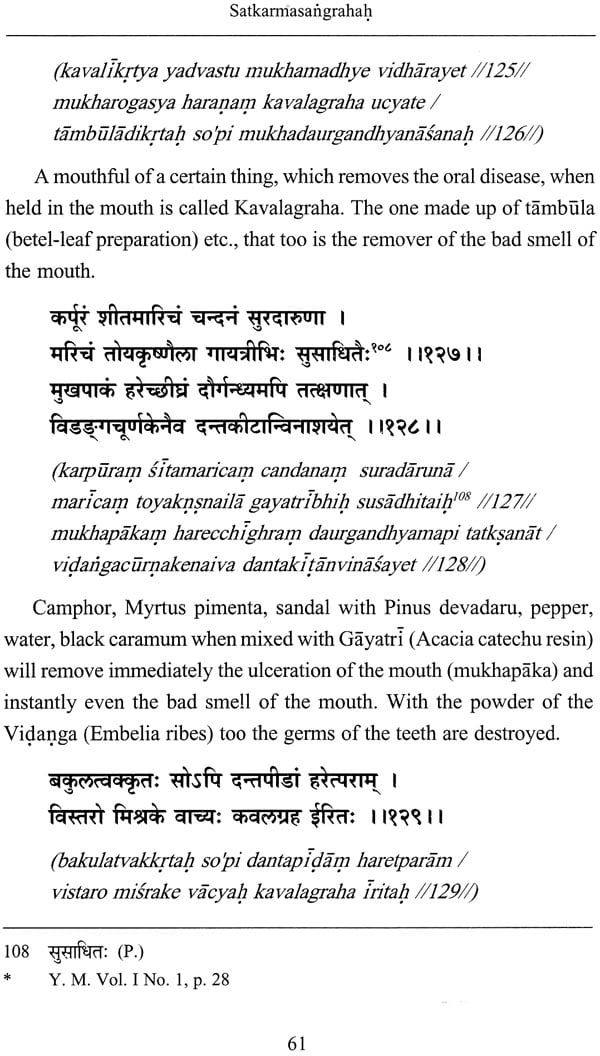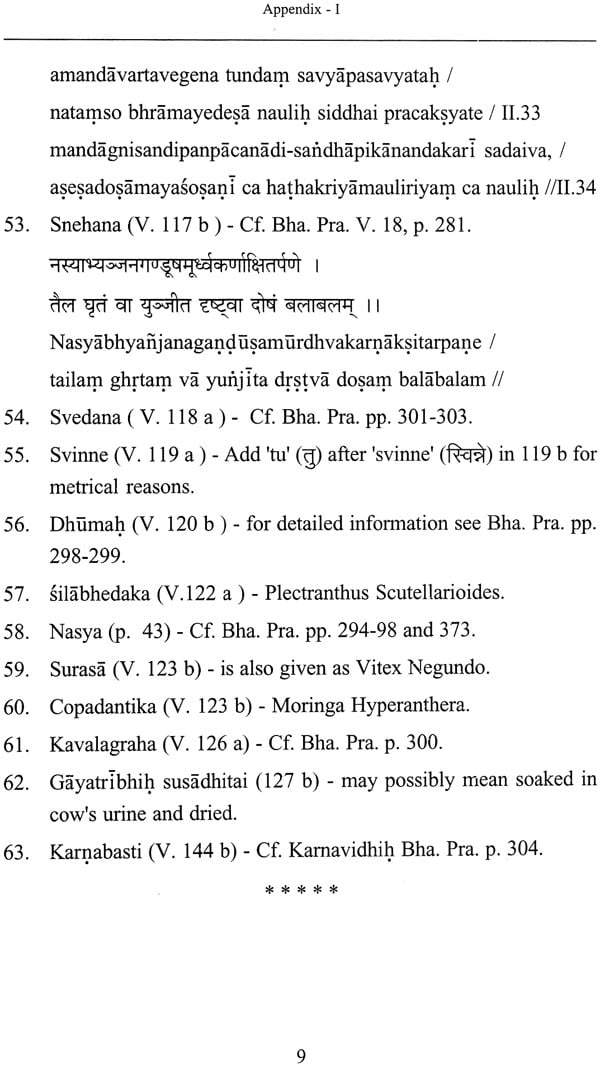
Satkarmasangrahah
Book Specification
| Item Code: | NAR577 |
| Author: | Dr. R. G. Harshe |
| Publisher: | Kaivalyadhama Samiti Lonavla |
| Language: | Sanskrit Text With Transliteration and English Translation |
| Edition: | 2017 |
| ISBN: | 9789387198012 |
| Pages: | 104 |
| Cover: | PAPERBACK |
| Other Details | 8.50 X 5.50 inch |
| Weight | 150 gm |
Book Description
Satkarmasangrahah is a small brochure consisting of about 149 verses but is a very useful and practical handbook to the students of yogic practices.
We are glad to present Satkarmasangrah, edited and translated by Dr. R. G. Harshe, B. A., D. Litt, with the help of the scholars of Kaivalyadhama. This work was serialized in Yoga-Mimamsa, Vol. XI and now it is ready for being published in a book-form with an introduction and several appendices. In certain places the editor admits his inability to translate the texts, e. g., verses 46 p. 17, 59-66 pp. 22-23; 69-70 p. 24; 73, p. 25; 101 p. 36. We invite the help of our readers who can translate these mystic slokas (as we feel them to be) for the benefit of humanity. This text describes many cleansing processes which are concerned with Yoga. The description of Basti is very clearly given in the text.
We hope that this book with all its limitations will be useful not only to scholars of Yoga and Ayurveda, but also to the aspirants who are engaged in Yoga practices.
Satkarmasangrah is a small brochure consisting of about 149 verses but it is a very useful and practical handbook to the students of Yogic practices. It needs no apology for its publication as books on Yoga, published so far, are so few in number.
This edition of Satkarmasangrah is based on two manuscripts both available at the Bhandarkar Oriental Research Institute Poon-4. One of them is named Satkarmasangraha (S) and its No. is 953/1891-95, New No. 17; it is described in Vol. XVI, Part I, of the Catalogue of Skr. Mss at the Serial No. 34. The other manuscript is entitled Karmapddhati, (P) and its No. is 559 (1884-87) of the Government Mss. Both these are by Cidghananandanatha and although they bear two different names, they are virtually copies of the same work. No date of composion is given in the text. Both are linguistically defective, possibly due to scribal errors. Important readings from these two Mss. have been noted and a constituted text is given with viriants in the footnotes.
The text has been translated into English and additional notes given at the end along with various indices, namely, ( i ) Personal names referred to in the Text, (ii) Technical words used, ( iii ) Names of the diseases and ( iv ) the names of the Medicinal Ingredients. Certain passages containing mystic words and symbolical expressions had to be omitted in the translation.
The author of this work apparently seems to be Cidghananandandtha as mentioned in verse No. 4 : "Cidghananandanatho'ham kurve Satkarmasangrahm. But the statement in verse No. 148 : "iti sanksepatah" proktah karmanam sangrahah parah vidusa raghuvirena srimannathaprasadatah" is in direct contradiction to the above and ascribnes its authorship to one Raghuvira Raghava or Raghunatha. There is another reference in verse No. 90 which says : "granthan drstva praktanannathamargan suddhir divy a raghavena pranita ." The contradiction may be explained by supposing that either Raghuvira or Raghava was the original name of the author before adopting the name of cidghananandandtha of the Natha Sarnpradaya, or perhaps the original work was a bigger one and that Raghuvira, one of the leter disciples in the tradition, brought out a concise edition of the work for general use.
There is very little information available regarding our author and his date. The refernce to the Audicya Brahmin in verse No. 149 is, in all probability, to the scribe, as usual, and not to ther author. The Audicyas are supposed to be a sect of the Gujarati Brahmins There is no indicaions of the date even of the copying of the Ms. but it is recorded that the Mss. were procured between 1884 and 1895 A. D. and we can safely consider the original date of the composiion of the work as more than 150 years old.
The original authour calls himself as the disciple of Gagananandandtha and although this name has been noted by Monier Williams (Skr.Dict.Ed.1956,p.341), no direct information is available of him. Cidghananandanatha seems to have written another more elaborate work named Migraka (vide references to verse Nos. 123, 125, 129) and as the title indicates it must have been a treatise having an admixture of Yoga and Medicine. Bhavaprakaga, while describing general diseases and their treatment, has used the name Misra. It is likely that Misraka of Raghava (Cidghananandandtha) may have been a work of the similar nature.
**Contents and Sample Pages**
